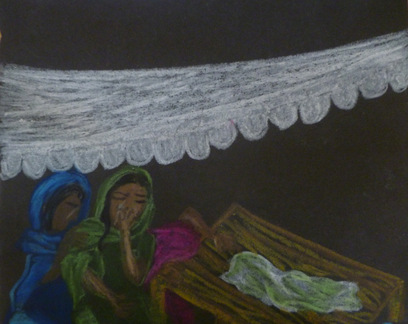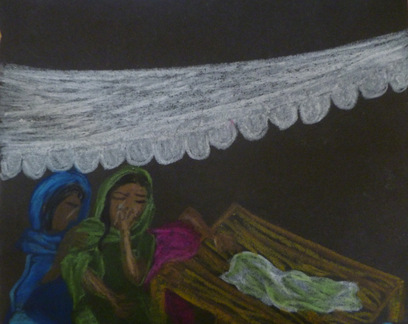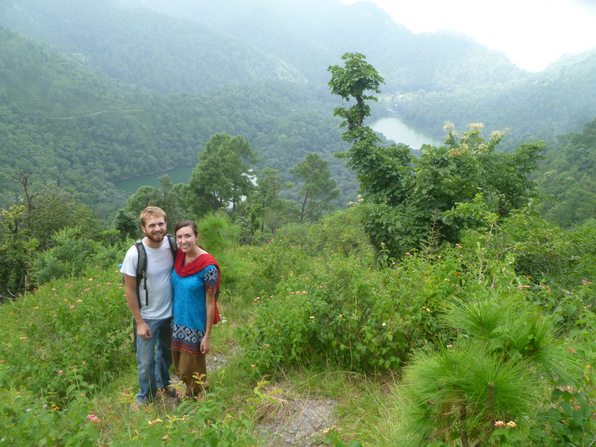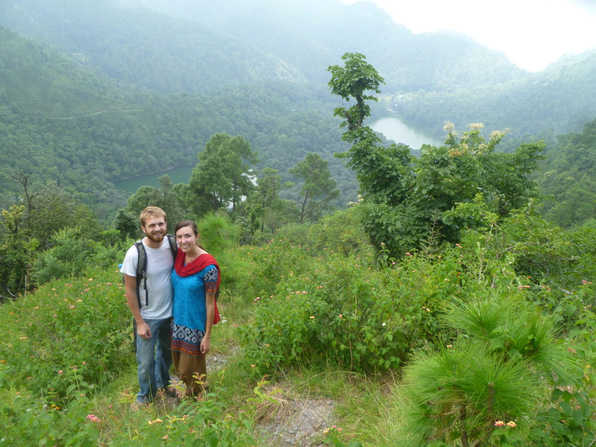After coffee, my husband and I wandered around, enjoying the spacious sidewalks and temperate weather. We passed by huge, glass storefronts with mannequins behind them sporting either Western-style designer ensembles or luxurious saris worth hundreds of dollars, never mind rupees. We walked past the flashy mall which a neighbor had once described to us after a family window-shopping outing as a wonderful place “where it’s cool in the summer and warm in the winter,” and where they had been fascinated by the “moving staircases” but were too terrified to ride them from one floor to another.
The people who milled around us now were likely unimpressed by the escalators inside: they all wore Western clothing, carried smart phones, and drove cars and fancy motorbikes. Probably they were more drawn to the Western labels and fashions which have become status markers in Indian society, helping people to project a cosmopolitan and cultured image. From inside the mall, brightly-lit signs for KFC and Dominoes Pizza welcomed patrons into upscale restaurants which certainly would not be associated with those same signs in the small towns that I remember as pit-stops on the long American road trips of my youth.
In a way, all of this felt familiar—hadn’t I also worn Western clothes, carried an iphone, driven a car, and gone out with friends in my previous life? All of those things had been so normal in America, but here they were alien experiences. I have never shopped at a mall in India. I have lived in this city for a year and a half without ever seeing most of the coffee shops, stores, bars, and restaurants where wealthy, educated Indians in my city hang out. Instead I have been to village weddings and Muslim saints’ graves, outdoor markets and public hospitals, train stations and slums.
It’s ironic, because actually I would rather go out for gelato on a special occasion than spend hours making buffalo biryani at home to celebrate something important. And I don’t particularly enjoy Indian weddings or visiting saints’ graves as a leisure activity, but I accompany my friends to these kinds of places because it’s what they do for fun, on the fairly rare occasions that they go anywhere at all. I’m not Indian, I’m not a Muslim, I’m not from the village, and I come from a wealthy, educated background, so it’s strange when I run into another expat or an Indian coworker at an NGO. They’re wearing Western clothes and talking about the city’s nightlife and checking facebook. They’re puzzled by my bangles and Indian dress, and my apparent ignorance about the city’s restaurants and bars; it’s hard to answer the unspoken questions about why I don’t do all of the “normal” things that they already associate with my culture. Why am I emulating people who are lower-class and “backward”? No one aspires to move into a slum, any more than someone would aspire to move into the projects, or into a trailer park, if they had another option. Am I just putting on some kind of act, pretending to be poor?
It’s a question worth asking, in order to make sure I’m not losing or hiding myself in the midst of all this radical “adjustment” across culture, religion, and socioeconomic class. But I really believe the answer to that question is, No, I’m not pretending to be someone I’m not. I’ve just chosen to make a lot of choices in my life based on a desire to relate to people who are different from me and to meet them on their own turf. That means that the superficial aspects of my life—food, clothing, social habits, etc.–often reflect the culture to which I am adapting rather than my own preferences or sensibilities. It means that what was foreign becomes familiar and what was familiar becomes foreign. But my hope is that the essential core of who I am and what I’m about will remain unchanged; merely translated into a new language, or converted into a new medium.
I know that my choices are strange, but my old life just doesn’t seem normal either, anymore. In America, jeans and English and a high school education don’t make you privileged, but here they do. In India, Western habits and food and clothing are all luxury commodities in themselves; the English language is a status symbol. I feel uncomfortable in the wealthy areas of the city because when I go there, the poor—the people I have lived among for the past two years—are still part of the scene, but as rickshaw pullers, children selling balloons on the side of the road, beggars entreating passing shoppers for change. I have begun learning to see things from their perspective, so it feels strange and wrong when I go to these places and feel that I’m being grouped in again with the wealthy shoppers, unaware and uninvolved, instead of with the poor on the sidelines.
Perhaps the main reason these situations feel uncomfortable for me is that they actually force a sort of crisis of identity: where do I fit, after all? Me, the foreigner with access to nearly limitless resources and opportunity, who owns a laptop and an ipod and a facebook account, but who lives without AC, speaks Hindi, and spends more of her time with illiterate village migrants in a slum than with people of her own race, religion, nationality, or socioeconomic background?
An outsider on the inside, an insider on the outside.
New to India, and yet more acquainted with its harsh realities than most of the middle- and upper-class Indians who have spent their whole lives here.
Integrated into the slum, and yet a total stranger to the worldview that orders my neighbors’ universe.
Sharing in my neighbors’ experiences, and yet completely unversed in the tragedy, suffering, and desperation that has shaped so much of their lives.
I’m still trying to find my place in this society. So my life feels strange to myself, when I bump into my old life unexpectedly in an expat or a wealthy Indian. Yet again, I find that life here forces me to learn more about myself than about anyone or anything else.
Source: New feed




